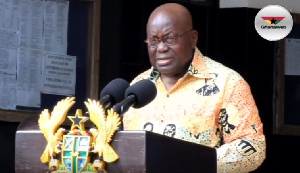President Nana Addo Dankwa Akufo-Addo may have genuine concerns of appointing a record number of 110 ministers to help him administer the country for the next four years, however, it is not the most convincing indicator of government’s willingness to ensuring efficiency in the delivery of its mandate, Penplusbytes, a not-for-profit organisation driving change through innovations using new digital technologies, has said.
In a statement, the organisation said: “Penplusbytes is deeply excited about the vision of Ghana’s President, Nana Addo Dankwa Akufo-Addo, to ensure progress and economic and social growth of the country. However, we have significant concerns about the size of this government currently at 110 Ministerial and Deputy Ministerial positions.
In our fast-growing information society where with the aid of new digital technologies complex tasks can be done more efficiently and effectively without deployment of plenty hands, countries today are leveraging the power of technology to ensure better governance and more importantly, be more responsive to the needs of citizens.
“In this direction, it is possible for President Akufo-Addo’s government to still achieve its vision for the country, implementing his barrage of campaign promises with a smaller number of ministers backed by smart bureaucracy which is riding on state-of-the-art e-government and e-governance systems.
With Information Communication Technologies (ICTs) transcending every area of modern life, Penplusbytes is advocating, in line with government’s agenda of improving the lot of Ghanaians, for a renewal of commitment to the adoption of E-governance systems that wield enormous potential in reducing the cost of government operations, improving transparency and accountability and bringing about efficiency in the governance process.
“Inasmuch as the President’s number of appointments is in conformity with Ghana’s constitutional provisions granting him discretional powers and authority, Penplusbytes believes that there is a huge potential in the use of ICTs in strengthening bureaucracy, making government more responsive and creating channels for citizens’ voices to be heard. More importantly governance is challenging, our premise is that with technology citizens can give a helping hand to negate the need for a huge government since there is more participation from active citizens not spectators.
“Unique as Ghana’s challenges are, the country need not reinvent the wheels as many democracies have recorded measurable, relative economic successes and prosperity by keeping to a downsized ministerial cabinet and making immense use of e-governance systems…
“Ghana does not need to have five ministers at the Ministry of information when there is a wide usage of technology tools such as SMS, WhatsApp, Twitter, Facebook, and offline media like radios just to name a few for government to have a two-way communication with the citizenry. Information from a verified and reliable source on such platforms is an easy and inexpensive means of communicating with citizens and spreading any message in various forms (text, voice or pictures).
Towards the recent general elections, various political parties made significant use of these media outlets and the NPP was particularly commended for their presence and use of social media in reaching to the electorate. Why then should the government now resort to the use of ministers with its attendant cost rather than use social media and other digital tools of communication?
“Further, the appointment of a Minister of state in charge of public procurement is totally not necessary when citizens can be ‘conscientised’ to use new digital technologies to provide oversight on public procurement and report any instance of irregularity, shoddy contracts or corruption. With open contracting under E-procurement systems in place, we do not need a minister to keep an eye on procurement processes since all stakeholders with access to the internet can view all public procurement transactions…
“It is our belief that the people of Ghana are ready for the right kinds of changes that would propel Ghana forward and only the most viable set of methods should be adopted in this quest, which Penplusbytes believes technology should play a central role and be the game changer.
The President’s choice of a large cabinet maybe well-intended but it is not the most convincing indicator of government’s willingness to ensuring efficiency in the delivery of its mandate.
Though it is the right of the President to appoint any number of ministers as guaranteed by Ghana’s constitution, it is imperative to note that advancement in new digital technologies provides a unique opportunity to achieve same set objectives without having a big size government. This technology approach is not only progressive but also ensure as a country we are not set in Stone Age.”
General News of Tuesday, 21 March 2017
Source: classfmonline.com

















